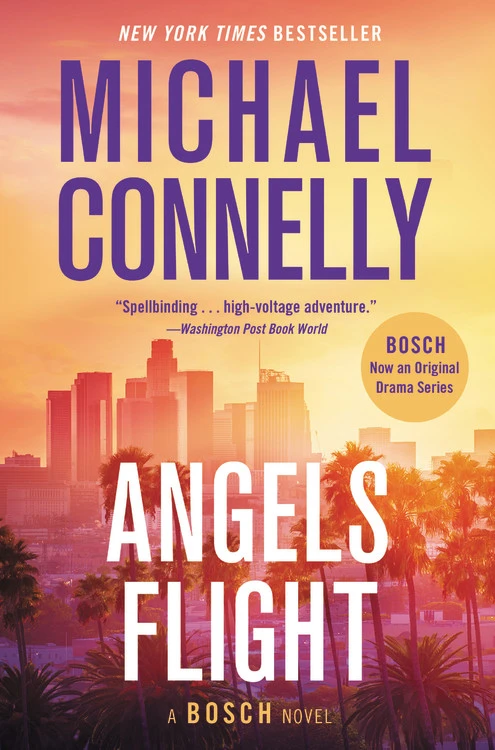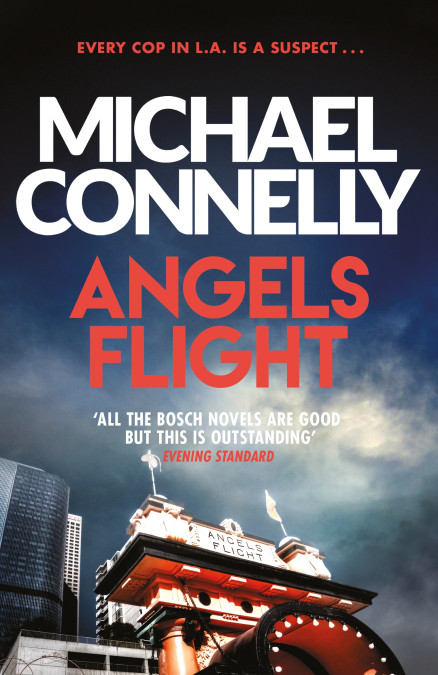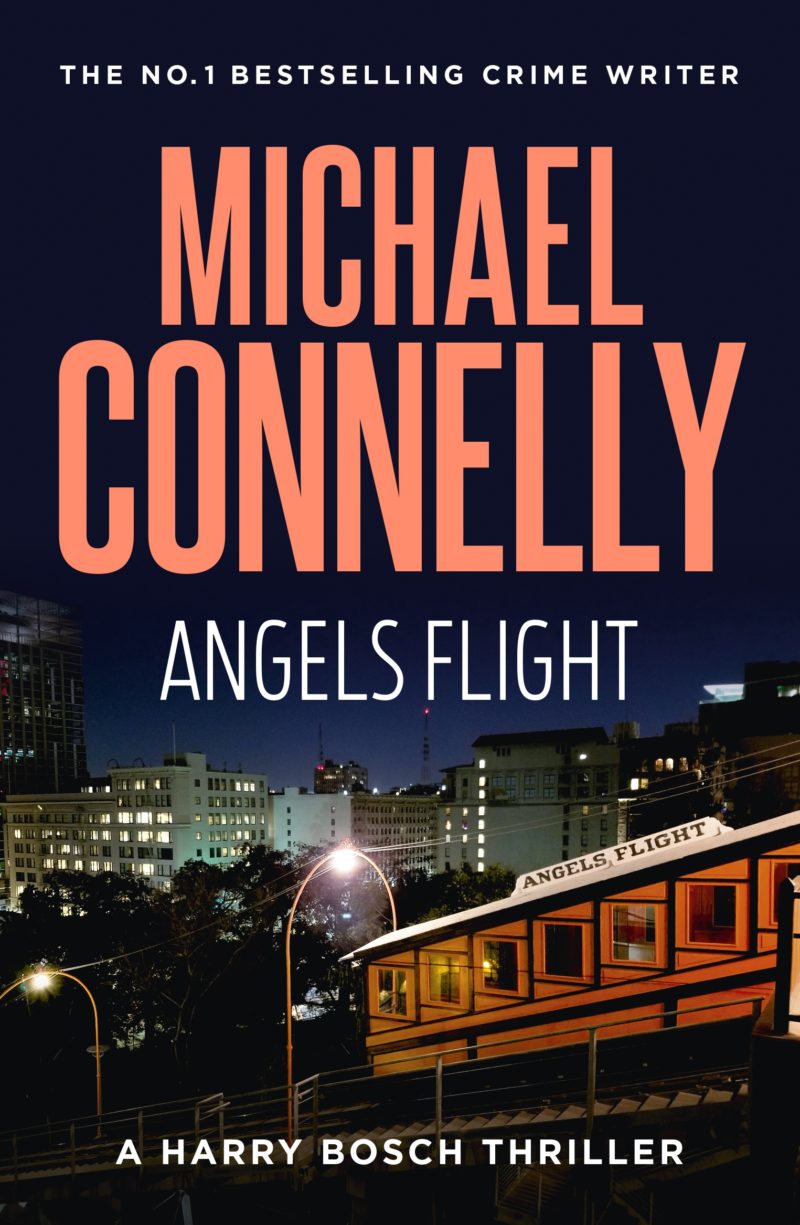Angels Flight Lost Chapter: 1965
Angels Flight Lost Chapter: 1965
Published here for the first time is a chapter from Angels Flight that never made it into the final published book. It is a glimpse into Harry Bosch’s past.
Michael was asked where this chapter fit into the book. Here’s his answer:
“I stopped writing the book about halfway through and wrote “1965” without knowing if there would be a place for it. The book, while at foremost being a detective novel, is also a bit of a meditation or rumination on racial tensions in Los Angeles. As I was writing it I came to realize that Harry makes some observations about racism and race relations and that it would be good to know where he comes from and how he would come to make such conclusions. So I decided to stop the writing of the book and just write a story in which Harry encountered significant racism for the first time.
I have always been fascinated with how families pass on tradition and custom — both good and bad. If you grew up in a house where only Coke was served as a soda, then there is a good chance you will be a Coke drinker as opposed to a Pepsi drinker as an adult. If you grew up in a house where your parents used the word ‘nigger’ then it is likely you will use it and maybe pass it on to your own kids. I wanted to write a story where Harry experienced this but was able to escape its hold on him. I also wanted to put a little twist in his gut and create a situation where he had to second guess his own actions in terms of whether they were subtly racist — just as he would later on in the Angels Flight case. Therefore, writing “1965” was very helpful to me in writing Angels Flight even though I knew the memory from Harry’s past would most likely not make it into the book.”
1965
On the way to Harry’s new home with his new parents, his foster father looked back over the front seat of the Corvair at him and said, “We saved you from the niggers, boy, don’t forget it.”
It had been true that the McLaren Youth Hall had a majority of black custodies but there had never been any problems between the blacks and whites while Harry had been there. The dormitory in which he lived had a power structure and cliques that could be dangerous to the unwary or uninvited, but these were fully integrated as membership was based on size and menace and rep — things other than race.
His fosters — whose name just happened to be Ed and Eileen Foster — were hardline Catholics and they enrolled him in Saint Ambrose’s for tenth grade. Harry was a poor student but still liked to go to school to get away from the Fosters. He liked to watch the girls — McLaren had housed boys only and close observation of the opposite sex was new and fascinating to him.
One morning Harry came in for breakfast from the room in the garage that had been fixed up with a bed and a bureau for him to use and Ed told him he wouldn’t be going to school that day.
“The natives went nuts last night,” he explained. “Better you stay home safe today.”
He pointed to the television on the counter in the kitchen next to the stove where Eileen was making scrambled eggs for them. Harry saw black and white film of the burning of a store, then an edit cut to a rippling, moving mass of angry black people in a street somewhere.
“That’s here?” he asked, not comprehending that such a thing could happen in his city. “That’s L.A.?”
“Watts. You’re staying home till things cool over. You can do some weeding in the back if you want something to do.”
Harry just stared at the television. They lived nowhere near Watts but he thought about two of the boys he knew from McLaren. Spencer and Figgs. They had come from Watts and he wondered if they were in front of the television in the dorm rec room watching their neighborhood burn.
“Typical,” Ed said. “They burn their own places down. What good does that do’em? The news says the National Guard is comin’ down. They’re gonna be moppin’ the streets with black blood.”
Harry looked at Ed, not sure what it was he meant, and then back at the television.
“You change out of that uniform before you go working in the back,” Eileen instructed him.
A month after the riot there was a Sadie Hawkins dance in the school’s gymnasium. It was where the girls asked the boys to go and Harry wasn’t expecting anything. He had made no friends and only small talked with one of the girls in his class. He mostly just watched — the cliques having been established during the freshman year when he had still been in McLaren. Plus he had to work after school and never had the time to hang out on the wall by the school’s parking lot with the other kids. The one girl he knew to talk to was a fellow outsider named Estrella Arceneaux and he only knew her because they were class left-outs who shared the same lunch table everyday. There was a boy with a polio leg who also sat at the table but he always read Hardy Boys books during lunch and didn’t speak.
That left Harry and Estrella. She, too, was in a clique of one — not because she was new to the school or had difficulties making social adjustments like Harry. She was an outsider because she was the only black student in the class. On the Thursday before the Saturday night dance she asked Harry if he would go with her and he said he would.
Harry asked Ed Foster to drop him off at Estrella’s house on Saturday night. As he drove and followed the directions Harry had gotten over the telephone from Estrella, Ed Foster’s face slowly tightened into a scowl. Finally, he slowed to a stop as if he believed that if he were to drive any further he would cross some line in himself.
“Son, you know we’re goin’ into niggertown here, don’t you?”
Harry did not know how to reply. He never used the word his foster father used so often and to answer the question yes would be to acknowledge it. Even then he knew this would translate into a disrespect for the girl who had asked him to the dance.
“This girl is either colored or might as well be if she’s livin’ over this ways,” Ed said when Harry didn’t answer.
“She’s a negro,” Harry said, using the proper idiom of the day. “Not colored.”
It felt good inside to challenge the old man. And Harry suddenly knew that he had set the whole thing up this way so that he could do it.
Ed Foster’s right hand came off the steering wheel too quickly for Harry to react. It hit him on the mouth, cutting his lips against his teeth. He held his hand to his mouth but blood dripped on the crisp white shirt he had bought at Buffums with money earned from bagging groceries at the store where his foster father ran the produce department.
“You’re dancing days are over,” Ed said as he put the car into a U-turn. “You like negroes so much then that little shot there ought to give you a set of fat nigger lips, all right.”
At the first stop Harry opened the car and got out. He just left the door open for Ed to worry about closing. He walked back in the direction of Estrella Arceneaux’s house. He got there a half hour later with his new shirt ruined and his lips swollen. Estrella’s father answered the door and at first thought some of the local boys had roughed him up. They weren’t in Watts but close enough and things had been tense everywhere since the riot just the same. Harry said that wasn’t it and apologized to Estrella for messing up the dance. He knew they couldn’t go with him looking the way he did.
Mr. Arceneaux took Harry into a bathroom and cleaned the blood off his face and had him rinse his mouth with warm water. He never asked further questions about what had happened because he probably knew. He brought Harry ice wrapped in a wash cloth for his mouth and told him to take his shirt off. He then went and got him one of his own to wear. It was big on Harry but the gesture wasn’t lost.
“Your daughter is pretty,” Harry said. He couldn’t think of how to explain what he felt or was thinking. “She’s also very smart. Sometimes at lunch she helps me finish my homework.”
Mr. Arceneaux just smiled and nodded.
He drove them to the dance. On the way, Mr. Arceneaux turned on the radio. Harry and Estrella sat in the back and listened to the strange music her father had tuned on the radio. No music Harry had ever heard hit him like this, the way the sound moved inside him. In his blood. He remembered his mother playing records with black men on covers but at the time he was too young to pay attention. Now he did. Estrella’s father looked at him in the rearview and smiled. He had a gold tooth.
“You like the Bird, huh?”
Harry didn’t know why he would call his daughter a bird and why she didn’t protest. But because the man was smiling at him Harry just nodded. He wouldn’t realize what Mr. Arceneaux really meant until a couple years later.
At the gymnasium they danced a few times but mostly watched other kids and tried not to act like they knew they were being watched. But Harry drew a strange feeling of power and freedom from being with Estrella. From knowing they were being watched while they slow danced to Sam Cooke singing about being up on a roof. The two class left outs had everybody’s eyes on them and it emboldened Bosch. He told Estrella the whole story. About what his foster father had said and done. He told her that he knew he would be sent back to McLaren now and that it was what he wanted.
Estrella’s face turned serious and then angry. She put a look on Harry that cut him open. He saw hurt and anger and most of all disappointment all at once.
“What?”
“You used me, Harry.”
“What?”
“You used me to get back to that place. Don’t you see what that is? How ignorant it is? I’m a person, not a —”
“Ignorant? No, I just —
“The people like your foster father aren’t the worse problem. We see them coming a mile away. My father says it’s the ignorant ones — the ones who are subtle — those are the ones that do most the damage.”
She left him there, speechless, and walked from the gym. Her father was in his car waiting in the parking lot. The school was so far from their home that it hadn’t been worth it for him to drive home and then come all the way back.
Harry followed Estrella out. He could hear the same kind of music coming from her father’s car as he approached. Estrella was in the front seat, on the other side of the car from Harry and looking out the side window away from him. Her father looked at Harry as he came up.
“Son, you get fresh with my daughter?”
“No, sir.”
“Well, I have to give you taxi money cause she doesn’t want to ride with you no more.”
Harry looked past his shoulder at Estrella. She glanced back at him, gave him the look once more, and then turned back to the window.
“That’s okay,” he said. “I can walk it. It’s not far.”
“You sure. It’s my responsibility to see you home now.”
“I’m sure. I want to walk.”
After they drove away Harry remembered he was wearing Mr. Arceneaux’s shirt and wondered how he would get it back to him.
He got home an hour later and found Ed Foster waiting in the living room. Harry’s clothes and few other belongings, including a rolled poster of a Hieronymus Bosch painting that his mother had given him, were waiting for him in two cardboard banana boxes.
“Come on, boy,” Ed said. “We’re going back tonight.”
Harry never got a chance to say goodbye to Eileen Foster. And he never saw Estrella Arceneaux again.


